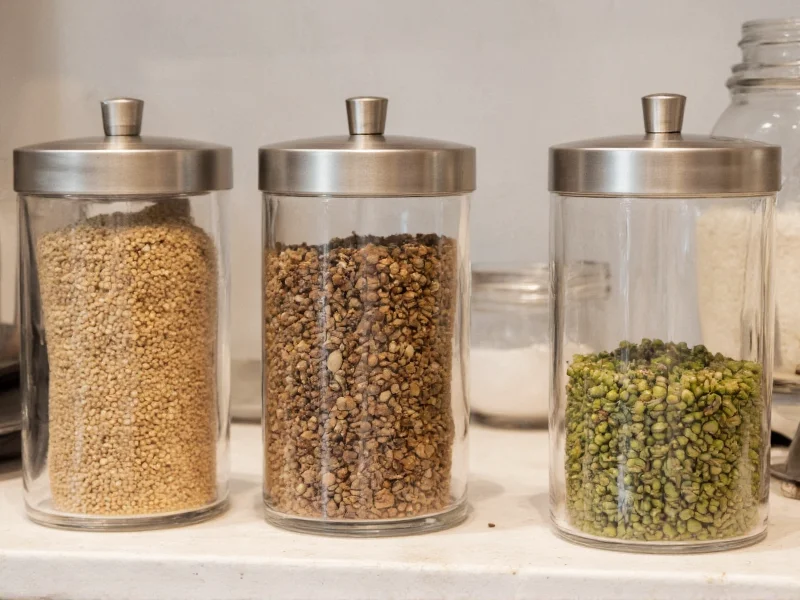Understanding Seasoning Container Essentials
Proper spice storage directly impacts culinary results. When selecting seasoning containers, prioritize features that combat the three primary enemies of spice quality: light, air, and moisture. Professional chefs and home cooks alike recognize that even premium spices lose potency within 6-12 months when stored improperly. The right containers extend shelf life while maintaining consistent flavor profiles essential for reliable cooking.
Material Comparison: Strengths and Limitations
Each container material offers distinct advantages for specific storage needs. Understanding these differences helps match containers to your kitchen environment and spice usage patterns.
| Material | Best For | Limitations | Lifespan Extension |
|---|---|---|---|
| Glass with UV protection | Long-term storage of expensive spices | Fragile, heavier weight | 12-18 months |
| Stainless steel | High-moisture environments | Opaque (hard to identify contents) | 9-12 months |
| Ceramic with tight seal | Decorative countertop storage | Potential moisture retention | 6-9 months |
| BPA-free plastic | Budget-friendly organization systems | Potential odor absorption | 3-6 months |
Critical Design Features for Optimal Performance
Airtightness represents the single most important feature in effective seasoning containers. Look for containers with silicone gaskets or threaded locking mechanisms that create a complete seal. The best moisture-proof seasoning containers incorporate dual protection systems—combining tight seals with desiccant compartments for humidity control.
Dispensing mechanisms significantly impact usability. Shaker lids with adjustable openings accommodate different spice textures, while flip-top designs work better for larger herb pieces. For those organizing spices in small kitchen spaces, stackable spice container systems maximize vertical storage without sacrificing accessibility.
Organization Strategies for Maximum Efficiency
Effective spice organization follows three principles: accessibility, visibility, and logical grouping. The most functional kitchen spice storage solutions arrange containers by cooking frequency rather than alphabetically. Place daily-use spices at eye level in easy-to-reach locations, with specialty ingredients stored higher or deeper.
Consider implementing a labeling system that includes both spice name and purchase date. This practice prevents using degraded spices and simplifies rotation. Magnetic labels or chalkboard stickers provide flexible identification options for easy-to-label seasoning jars without damaging containers.
Maintenance Practices for Longevity
Proper cleaning preserves container functionality. Hand wash seasoning containers with mild soap—avoid dishwashers which can degrade seals over time. Completely dry containers before refilling to prevent moisture-related clumping. For salt and other hygroscopic spices, include silica gel packets in your best containers for long-term spice storage.
Regularly inspect seals for wear and replace containers showing cracks or compromised airtightness. This maintenance ensures your stackable spice container systems continue providing optimal protection against flavor degradation.
Avoiding Common Storage Mistakes
Many home cooks unknowingly accelerate spice degradation through common errors. Storing spices above the stove exposes them to heat fluctuations that destroy volatile compounds. Clear containers on open shelves allow light exposure that fades color and flavor. Transferring spices directly from grocery bags introduces moisture when the bag returns to room temperature.
The most effective spice container sets address these issues through thoughtful design. Look for opaque or tinted containers stored in cool, dark cabinets away from heat sources. When selecting glass vs plastic spice jars, consider your kitchen's humidity levels—glass performs better in moist environments.
Specialized Solutions for Specific Needs
Certain spices require specialized storage approaches. Salt benefits from anti-caking agents and larger dispensing holes, while delicate herbs like saffron need complete darkness. For those seeking the best seasoning containers for kitchen organization, modular systems with interchangeable lids accommodate these variations.
Pepper grinders represent a special category where whole peppercorns maintain freshness significantly longer than pre-ground pepper. The same principle applies to other hard spices like cumin or coriander seeds. Investing in quality spice grinders preserves flavor compounds until the moment of use.











 浙公网安备
33010002000092号
浙公网安备
33010002000092号 浙B2-20120091-4
浙B2-20120091-4